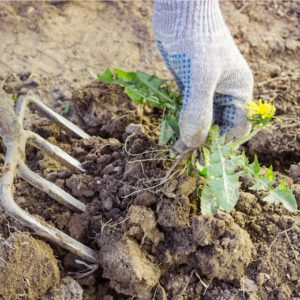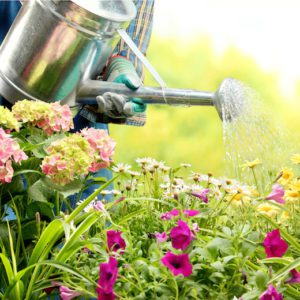If you’re just getting in to gardening, you may think mulch is simply a way to make a garden bed look orderly and neat. While this is certainly a great benefit of mulching your beds, the real reasons are far greater for your plants than they are for the aesthetics of your garden. Besides the clean look mulch gives your garden, here are three very good reasons to incorporate mulch into your garden beds.
3 Reasons to Mulch Your Garden Bed
Weed Control
Ralph Waldo Emerson said a weed is just a plant whose virtues have never be discovered. Sure, some “weeds” are actually not that bad, but when they’re growing where you don’t want them to be, they can cause a whole slew of problems for your plants.
The number one issue with weeds is that they can rob your beautiful flowers or herbs of the nutrients they need to thrive. Left unchecked, they can choke out your plants—severely stunting their growth, or even killing them. There are many ways to handle weeds, but one of the most efficient and effective ways is to simply cover the ground surrounding your prized specimens with a thick layer of mulch. The mulch can choke out unwanted plants, and keep the light from getting down to the seeds left behind by the unwelcomed volunteers. Sure, weed control will always be an ongoing battle, but you’ll be happy to know that making mulch part of your gardening arsenal makes the war a whole lot easier to win.

Water Retention
While your mulch is helping to tame the weeds, it’s also playing perhaps an even more important role in keeping your plants happy and healthy by retaining a critical garden input: water.
Just like us humans, plants need water to survive. Without it, they’ll wither away, leaving you wondering if you have a dreaded “brown thumb.” A consistent watering schedule is key, but you’ll have to water less frequently if your plants are blanketed with a protective layer of mulch. The mulch holds water, quenching your plants when they need it, but it also protects the ground from the sun’s rays, and more specifically evaporation, keeping the soil moister, longer. You’ll find that plants in mulched beds tend to do a lot better, especially in instances of drought or infrequent watering.

This can be especially beneficial if you’re in an area with watering restrictions, as the mulch will protect your garden until your next watering period.
One additional word of advice: because of mulch’s wonderful moisture retention properties, it’s a good idea to keep it away from the very base of your plants. Piling mulch up around the base of your plants can lead to issues like rotting on the trunk, so be sure to leave them a little room to “breathe,” and they’ll stay happy and healthy.
Soil Building
As a gardener, it’s always a good idea to keep your eye on the future of your garden. Whether it’s where to plant specimens that grow large—or if it’s actually a good idea to plant a bush that bees will love in an area meant for entertaining guests—thinking ahead is critical to longterm success. In this sense, mulch may be one of the most important factors in the quest for future garden health. While mulch is blocking out unwanted weeds and providing your plants with life-giving water, it’s also playing host to billions of tiny microorganisms and fungi that will break the mulch down over time and return it into your garden as “black gold,” or as it’s known in the gardening world, humus.
Humus is the organic component of soil which is one of the key differentiators between inert, lifeless dirt and a rich, organic soil full of life and nutrients. Year after year, new mulch added to your garden will be slowly be broken down into a thick, beautiful layer of black soil that will make growing future plants and herbs that much easier in the years to come. When using mulch, you’ll be surprised how quickly even the most sad soils can be transformed into the envy of the neighborhood. More importantly your plants will pay you back tenfold down the road.
There you have it—in the garden, mulch is one of your best friends. It’s a weed tamer, a water conserver AND helps build your soil, all at once. There are plenty of ways to get mulch, but we recommend you ask your local garden groups or shops what the most environmentally friendly and beneficial-to-your-garden options are available in your area. You may find that certain varieties do better in certain parts of the country. Try to stay away from big-box, overpriced dyed varieties of mulch, as these tend to break down quickly and lose their luster fast.
Got any questions or stories about using mulch in your garden? We’d love to hear them in the comments below.